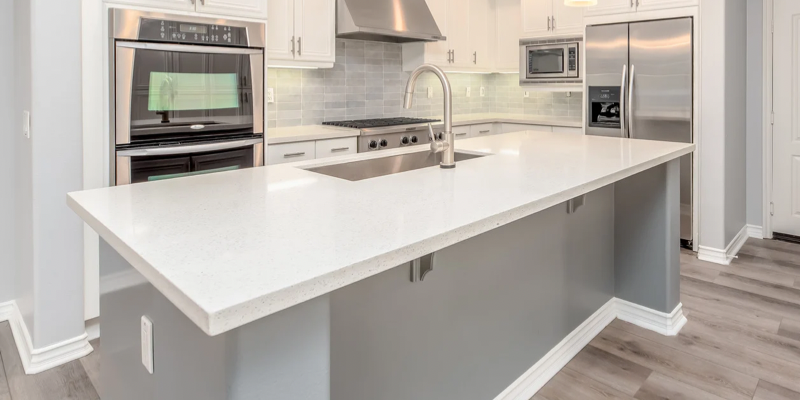Granite vs. Quartz

Granite vs. Quartz
When planning a kitchen or bath remodel with our clients we get a lot of question about granite vs quarts. Both options are great depending on your kitchen use and personal needs. Let us outline some key differences and similarities between the two to help you make you decision.
GRANITE
A large number of homeowners plan to use Granite countertops when they renovate. This is understandable when you consider that granite countertops are durable in addition to being beautiful and that this installation increases the value of their home. This is pertinent when choosing granite vs quartz. Available in slabs and smaller tiles, usually 12” by 12”, the tiles are designed for use on floors, but their smaller size makes them a good choice for DIY projects. Granite comes in a variety of colors with unique veining and is perfect for countertops, walls, backsplashes, fireplace surrounds, vanities, tubs and shower surrounds.
Pros:
- Very durable
- Naturally stain resistant
- Easy to care for, but regular sealing required
- Bacteria resistant
- Heat resistant
- Wide range of unique colors and patterns that occur organically
Cons:
- Can have naturally occurring design imperfections
- Regular sealing will help maintain its appearance
- May be difficult to match veining if you need more than one slab
QUARTZ
As for quartz, more than 93% of a Quartz countertop is made of natural quartz crystals. Quartz crystals are one of the hardest minerals found in nature making this an excellent material for durability. Another major key when making the decision granite vs quartz. It also is an eco-friendly choice since quartz is a plentiful mineral that impacts nature less than granite. With lots of choices of color and pattern, quartz is available to match any kitchen or bath. Quartz is perfect for countertops, vanities, backsplashes, tub surrounds and showers.
Pros:
- Wide range of colors
- Scratch resistant surface, slightly harder than granite
- Easy to maintain – no sealing needed
- Bacteria resistant
- Large slabs allow for more coverage and fewer seams
- Environmentally friendly
- Uniform color and appearance
- Stain resistant
- Heat resistant
Cons:
- Best-suited for interior use
- UV light can damage the appearance and color
Now that you know a bit more about the differences and similarities between granite and quartz, you can make an informed choice when you update your living space. As you can see, they both will make a lovely addition to your home.
Here’s a link to our portfolio to help you get even more ideas!







